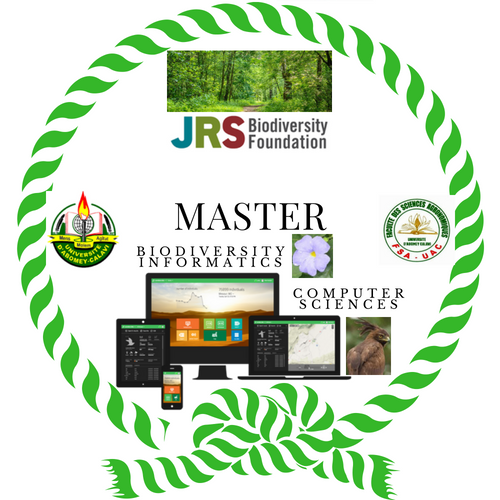University of Abomey-Calavi (2018)
Regional graduate course for capacity development in biodiversity informatics in Africa
Project Details
Last Updated: February 2nd, 2023
Background
 Before a country can produce its own biodiveristy data, it must have biodiversity information scientists. In Benin, there are an estimated 400 – 600 working biodiversity scientists in public and private agencies. While this may sound like a large number, there is still a need for scientists to adapt their approaches and employ the newest technologies to tackle new and evolving challenges. The changing climate and increasing pressures on biodiversity require biodiversity information scientists to consider even more factors than in the past when evaluating biodiversity.
Before a country can produce its own biodiveristy data, it must have biodiversity information scientists. In Benin, there are an estimated 400 – 600 working biodiversity scientists in public and private agencies. While this may sound like a large number, there is still a need for scientists to adapt their approaches and employ the newest technologies to tackle new and evolving challenges. The changing climate and increasing pressures on biodiversity require biodiversity information scientists to consider even more factors than in the past when evaluating biodiversity.
In order to achieve the conservation and sustainable uses of biodiversity in Benin and the rest of Africa, the University of Abomey-Calavi (UAC) has designed a Master’s Program for a new cohort of biodiversity informatics professionals. The program began in November of 2017. The students will undergo rigorous coursework over two years and be given internship and professional opportunities to engage with real informatics needs. The graduates of this program will go on to fill government agencies, NGOs, and universities to bring critical adaptive skills to data driven fields of conservation and sustainable development. With JRS Biodiversity Foundation support, a new cohort of 30 students will join the program. Twenty of the students will be from Benin and ten will be from other African countries, enhancing capacity for biodiversity informatics in Benin and beyond.
Key Objectives and Activities
1. Develop 30 Master’s students’ capacity in biodiversity informatics.
2. Build capacity in biodiversity informatics with other GBIF Benin partners (students and professionals) through an annual workshop.
3. Fill data gaps in priority areas of Benin and other countries.
4. Use data to develop appropriate products to inform decisions on biodiversity conservation.
5. Enhance staff development through internship opportunities to support future trainers.
Video Progress Update, May 2020
With COVID-19 restricting travel and meeting with our grantees, JRS invited our projects to submit a short update for the JRS Board of Trustees. Though intended for an internal JRS audience, we loved these videos and share them here with permission. Enjoy!
Planned Outputs
- 20 Beninese students and 10 international students will be recruited to the program.
- 80% of students will successfully graduate with high profile in biodiversity informatics.
- One workshop per year will be organized to train at least 50 other GBIF Benin partners in relevant topics of informatics.
- Trained students will conduct data gaps analysis in 3 thematic areas for their countries of origin
- Students will collect data and use to address information needs that will be shared with local stakeholders.
- Half a dozen teachers will be trained and pass a certification from the program alumni.
Planned Outcomes
Through the Master’s program, the UAC will build a cohort of biodiversity informaticists. The yearly workshops will engage with the GBIF communities to share knowledge and create networking opportunities for the Master’s degree students. The gap analysis and subsequent data collection aims to target real data needs in Benin and other countries that the students will represent; this applied approach will allow students to understand the complexities and data demands in their home countries, as well as address needs of stakeholders that can lead to data driven decision-making. Through training new teachers, the program can be sustained leading to greater capacity for informatics in Benin and beyond.
Results to Date
- The second cohort of Master’s students successfully defended their theses at the University of Abomey-Calavi, Benin. A video of their defenses can be viewed in English and French.
- The first cohort of 18 Beninese and 6 other African national students for this project have been successfully recruited.
- One workshop for 44 GBIF Benin partners has successfully been completed resulting in several new registrations of institutions to GBIF.
- Masters students have promoted data publications through their professional internships, leading to several additional registrations to GBIF. Publication of data is anticipated.
- The following GBIF publications are from students of the program:
Project Director Biography
The project director, Dr. Jean C. Ganglo, is a Professor of Forestry, teaching and doing research in forest ecology, biodiversity, and biodiversity informatics at the University of Abomey-Calavi in Benin. He is the node manager of the national section of the Global Biodiversity Information Facility (GBIF). Among the outstanding achievements, is the large mobilization and publication of more than 200,000 georeferenced data on GBIF Benin and GBIF portals and data use resulting in many scientific publications. He successfully pushed forwards and achieve the creation of the masters program of biodiversity informatics at the University of Abomey-Calavi with the kind collaboration of Professor Town Peterson of the Biodiversity Institute of the University of Kansas (USA).
Note from JRS
Capacity development is a major component of JRS strategy and higher level education directly supports this aim. The master’s program at University of Abomey-Calav is the first African-originated master’s program for biodiversity informatics. JRS is excited to support this ground-breaking program, and know that the impacts of this course will extend beyond Benin to other parts of the African continent. Dr. Jean Ganglo has long-standing experience successfully managing projects with outstanding results including the INBio project, a collaborative JRS project between Costa Rica and Benin, and a JRS 2014 Award for Implementation of the National Biodiversity Information System (NBIS) of Benin.
